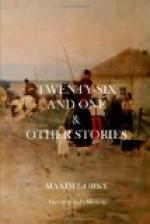But when one of us asked her to mend his only shirt, she declined, with a contemptuous sneer.
We laughed heartily at the queer fellow, and never again asked her for anything. We loved her; all is said in this. A human being always wants to bestow his love upon some one, although he may sometime choke or slander him; he may poison the life of his neighbor with his love, because, loving, he does not respect the beloved. We had to love Tanya, for there was no one else we could love.
At times some one of us would suddenly begin to reason thus:
“And why do we make so much of the girl? What’s in her? Eh? We have too much to do with her.” We quickly and rudely checked the man who dared to say such words. We had to love something. We found it out and loved it, and the something which the twenty-six of us loved had to be inaccessible to each of us as our sanctity, and any one coming out against us in this matter was our enemy. We loved, perhaps, not what was really good, but then we were twenty-six, and therefore we always wanted the thing dear to us to be sacred in the eyes of others. Our love is not less painful than hatred. And perhaps this is why some haughty people claim that our hatred is more flattering than our love. But why, then, don’t they run from us, if that is true?
Aside from the biscuit department our proprietor had also a shop for white bread; it was in the same house, separated from our ditch by a wall; the bulochniks (white-bread bakers), there were four of them, kept aloof, considering their work cleaner than ours, and therefore considering themselves better than we were; they never came to our shop, laughed at us whenever they met us in the yard; nor did we go to them. The proprietor had forbidden this for fear lest we might steal loaves of white bread. We did not like the bulochniks, because we envied them. Their work was easier than ours, they were better paid, they were given better meals, theirs was a spacious, light workshop, and they were all so clean and healthy—repulsive to us; while we were all yellow, and gray, and sickly. During holidays and whenever they were free from work they put on nice coats and creaking boots; two of them had harmonicas, and they all went to the city park; while we had on dirty rags and burst shoes, and the city police did not admit us into the park—could we love the bulochniks?




